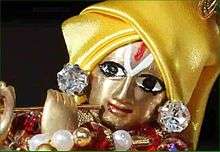Madhava (Vishnu)
Madhava (Sanskrit: माधव) is another name for Vishnu or Krishna and appears as the 72nd, 167th and 735th names in the Vishnu sahasranama.

From the Bhagavad Gita it is understood to refer to Vishnu being the husband of the goddess of fortune (Lakshmi). Arjuna addresses Krishna in the first chapter as follows:
"What should we gain, O Krishna, husband of the goddess of fortune, and how could we be happy by killing our own kinsmen?" (Bhagavad-Gita 1.36)
Also in the Bhagavad-Gita, Arjuna address Krishna as "Madhava" (meaning "Lord of fortune and also slayer of the demon Madhu").[1]
_idol._Mandi.jpg)
According to Adi Sankara' s commentary on the Vishnu sahasranama, Madhava means the consort (dhava) of the Mother (Ma), or Mahalaksmi, the 'Mother of the Universe'. Alternatively, it means 'one who is fit to be known through Madhu-vidya' or can mean 'One who is the Lord of "Ma" or knowledge'. Additionally, it can also mean 'One who was born in the clan of Madhu'.
Madhava worship has been very prominent in Odisha since ancient times. In the Prachi river valley several Madhav temples were constructed by the Hindu Kings of Odisha and this area was highly influenced by Brahmanic Vishanavanism. The great Sanskrit poet Jayadev was born an Utkala Brahmin in the Kenduli village of the Prachi River valley in 10th century. Madhava is worshiped as Nila-Madhava, Radha-Madhava, Durga-Madhava etc. The Brahmanic Vaishnavanism of Prachi River Valley later known as Utkala Vaishnavanism and it spread to many parts of India. Many prominent Bhakti & Vaishnava saints, and poets of medieval period like Vidyapati, Guru Nanak, Sri Chaitanya, and Srimanta Shankardev were highly influenced by the teachings and philosophy of Utkala Vaishnavanism & philosophy of the poet Jayadeva.
See also
References
- ↑ Maharishi Mahesh Yogi on the Bhagavad-Gita, a New Translation and Commentary, Chapter 1-6. Penguin Books, 1969, p 37 (v 14)
- Cited from Sri Vishnu Sahasranama, commentary by Sri Sankaracharya, translated by Swami Tapasyananda, available at Sri Ramakrishna Math, Chennai.